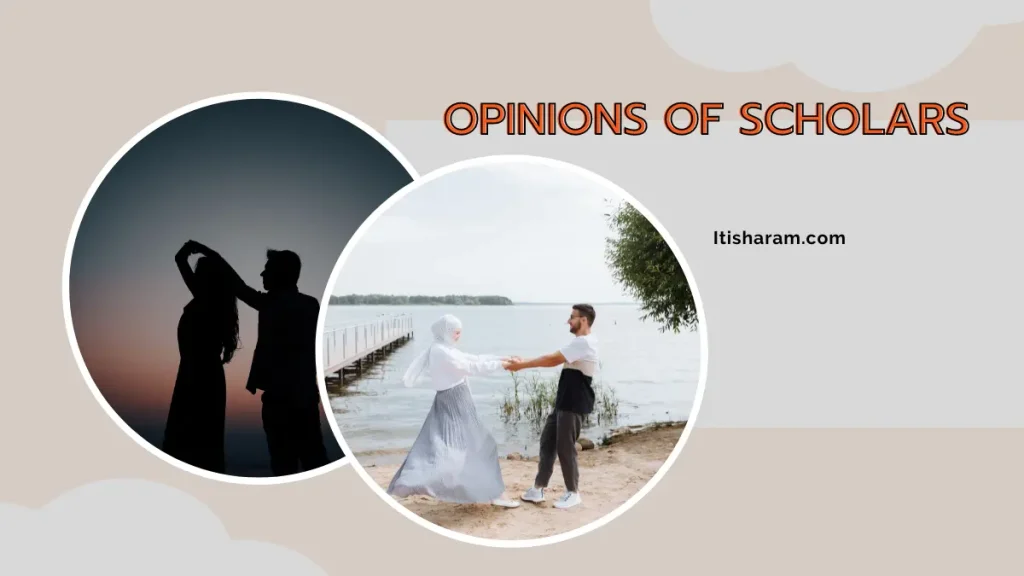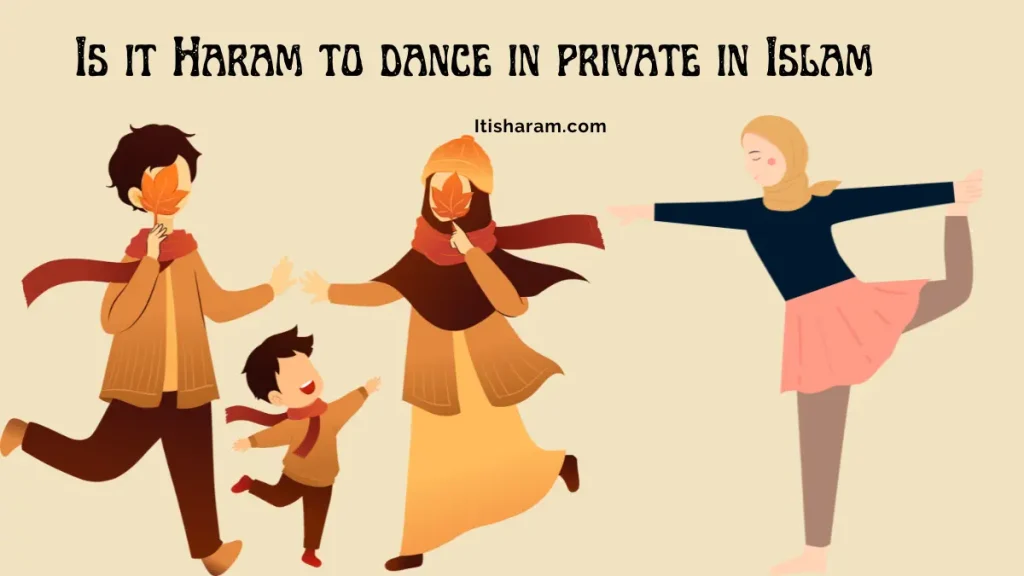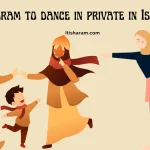Islamic entertainment is permissible, but within certain limits. Discussions about dance extend to many aspects of entertainment and life. One such thing many people want to know is, is it haram to dance in private in Islam? Although some scholars argue that certain types of dance are permissible in certain contexts, there are conditions for that.
Principles of Islam regarding dance
Islamic teachings emphasize the importance of decency, discipline, and avoiding actions that may lead to immoral or sinful behavior. Quranic verses and hadiths provide guidelines for personal conduct and interactions with others, aiming to promote righteousness and moral rectitude.
Short answer
No, it is not haram to dance in private in Islam? But what is meant by private needs to be specified. You can dance when you are alone in the room. This way you can dance in front of your husband. When girl friends get together, they can dance in secret, so that no one else sees.
If there is no one else in the house, then the husband and wife can do whatever pleasure they have for each other, if they are lawful. If a wife wants to show her husband dancing in private, they can do it indoors for their pleasure.
Evidence
قَالَتْ عَائِشَةُ رَضِيَ اللَّهُ عَنْهَا: كَانَ رَسُولُ اللَّهِ صَلَّى اللَّهُ عَلَيْهِ وَسَلَّمَ جَالِسًا فَسَمِعْنَا لَغَطًا وَصَوْتَ صِبْيَانٍ، فَقَامَ رَسُولُ اللَّهِ صَلَّى اللَّهُ عَلَيْهِ وَسَلَّمَ فَإِذَا حَبَشِيَّةٌ تَزْفِنُ وَالصِّبْيَانُ حَوْلَهَا، فَقَالَ: (يَا عَائِشَةُ تَعَالَيْ فَانْظُرِي) فَجِئْتُ فَوَضَعْتُ لَحْيَيَّ عَلَى مَنْكِبِ رَسُولِ اللَّهِ صَلَّى اللَّهُ عَلَيْهِ وَسَلَّمَ، فَجَعَلْتُ أَنْظُرُ إِلَيْهَا مَا بَيْنَ المَنْكِبِ إِلَى رَأْسِهِ، فَقَالَ لِي: (أَمَا شَبِعْتِ، أَمَا شَبِعْتِ) قَالَتْ: فَجَعَلْتُ أَقُولُ لَا لِأَنْظُرَ مَنْزِلَتِي عِنْدَهُ إِذْ طَلَعَ عُمَرُ، قَالَتْ: فَارْفَضَّ النَّاسُ عَنْهَا: قَالَتْ: فَقَالَ رَسُولُ اللَّهِ صَلَّى اللَّهُ عَلَيْهِ وَسَلَّمَ: (إِنِّي لَأَنْظُرُ إِلَى شَيَاطِينِ الإِنْسِ وَالجِنِّ قَدْ فَرُّوا مِنْ عُمَرَ) قَالَتْ: فَرَجَعْتُ”
This hadith is narrated by Aisha (may Allah be pleased with her), who said: “The Messenger of Allah (peace be upon him) was sitting while we heard noises and the voices of children.
The Messenger of Allah (peace be upon him) stood up, and there was an Abyssinian woman performing a dance while the children were around her.
He said: ‘O Aisha, come and watch.’ So, I went and placed my chin on the shoulder of the Messenger of Allah (peace be upon him) and looked over his head to watch her.
He said to me: ‘Have you had enough, have you had enough?’ I replied: ‘No,’ in order to see my status with him when Umar appeared.
Aisha said: ‘People moved away from her.’ She said: ‘So, the Messenger of Allah (peace be upon him) said: ‘Indeed, I see the devils of jinn and humans fleeing from Umar.'” (Narrated by Al-Tirmidhi)
This hadith is often cited in discussions concerning the permissibility of dancing in Islam, especially when it involves women.

Opinions of scholars
Islamic scholars have different opinions about dance. Some scholars argue that dancing is permissible if it does not involve sexually suggestive behavior, obscenity or violation of Islamic principles. such as mixing the sexes or displaying profanity.
Proponents of permissiveness cite examples from Islamic history where dancing has been deemed acceptable. Celebratory events such as weddings or religious festivals. They argue that as long as the dance is conducted within the constraints of Islamic guidelines. As maintaining modesty and avoiding sinful behavior, it is a permissible form of expression and enjoyment.
Conservative view
On the other hand, some Islamic scholars take a more conservative position, opposing any form of dancing. Even in private settings. They argue that dance, regardless of context or intent, potentially leads to immoral thoughts or actions. As a result, the principles of decency and piety promoted by Islam are contradicted.
According to this perspective, engaging in dance, even in private, can open the door to temptation and moral transgression. It is believed that dancing, especially when accompanied by music, can arouse sensual feelings and desires, which can distract individuals from their devotion to Allah and lead them away from the path of righteousness.
FAQs
Is it haram to dance in private with music?
Yes, it is haram to dance in private with songs. Ibnul Qayyum al-Jawziyyah said, “Dancing with music is the Quran of Satan. But can dancing and singing be done without music? Yes, dancing and singing without music is not prohibited. But it is certainly forbidden in front of a male mahram.”
Only girls (eg at weddings) can dance and sing songs (which do not contain any haram words) among themselves. But its sound and fury cannot reach men in any way. And as much part of the body is supposed to be exposed, it should be taken care that no more part is exposed during dancing.
What kind of dancing is permissible in private?
The types of dancing that are permitted in private are those that do not involve lewd or provocative movements and do not lead to sinful behavior.
Cultural dances that are performed respectfully and modestly may be permitted, as long as they adhere to Islamic guidelines regarding decency and decency.
Is it forbidden to listen to music while dancing alone?
Yes, it is forbidden to listen to music while dancing alone. There is also debate among scholars about the permissibility of listening to music while dancing in private. Some argue that music is not inherently forbidden in Islam, but certain types of music with inappropriate lyrics or themes may be discouraged.
Others take a stricter stance, advising against listening to music altogether because of its potential to lead to sinful behavior.
What are the considerations for men and women in private dancing?
Men and women cannot join together in private dances. In Islam, there are specific guidelines about interactions between men and women, even in private settings.
Both men and women are encouraged to practice modesty and avoid situations that could lead to seductive behavior. Therefore, any form of dancing should be done privately, with the utmost respect for modesty.
What does it mean to dance in private?
Dancing in private means dancing in a setting – one that is private, restricted, or not open to public viewing.
Such as dancing alone at someone’s house, dancing with a select group of friends or family members at a private gathering. It may be by closing the door in one’s room, which is not accessible to common people.
It can also provide a sense of freedom and relaxation. Because individuals may feel more comfortable expressing themselves through dance when they are in a private setting.







